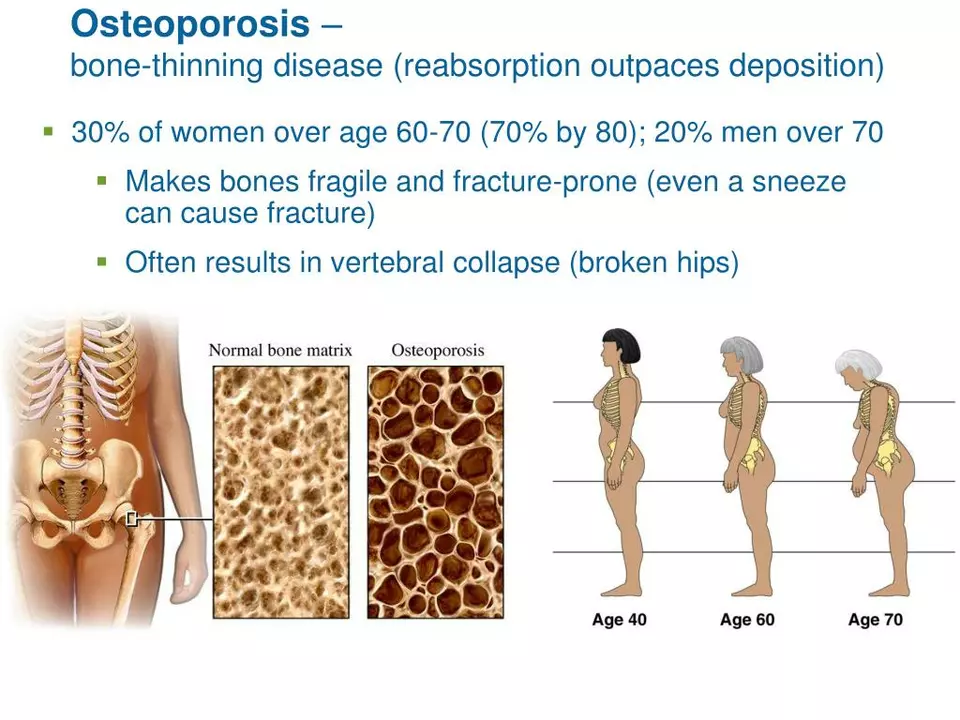Understanding Residronate and Its Effects on Bone Density
As we age, maintaining healthy bones becomes increasingly important. One of the medications that has gained attention in recent years for its potential to improve bone health is Residronate. In this section, we will explore what Residronate is, how it works, and why it's important for bone density management.
Residronate is a type of medication known as a bisphosphonate, which is used to treat and prevent a variety of bone-related conditions, such as osteoporosis and Paget's disease. It works by slowing down the rate at which bone is broken down and increasing the overall density of the bone. This can help to reduce the risk of fractures and other complications associated with weakened bones.
How Residronate Increases Bone Density
Now that we have a basic understanding of what Residronate is, let's dive deeper into the science behind how it increases bone density. Our bones are constantly undergoing a process called bone remodeling, which involves the removal of old bone tissue and the formation of new bone tissue. This process is essential for maintaining the strength and integrity of our bones.
Residronate works by specifically targeting the cells responsible for breaking down bone tissue, called osteoclasts. By inhibiting the activity of these cells, Residronate effectively slows down the rate of bone resorption, or the process of breaking down bone. This allows the bone-building cells, called osteoblasts, to continue forming new bone tissue, resulting in an overall increase in bone density.
Who Can Benefit from Residronate Treatment?
Residronate is not a one-size-fits-all solution for bone health. Instead, it is typically prescribed for people who are at a higher risk of experiencing bone loss or fractures due to certain medical conditions or factors. In this section, we will discuss some of the specific populations that may benefit from Residronate treatment.
Individuals with osteoporosis, a condition characterized by weakened and brittle bones, are often prescribed Residronate to help slow down the progression of the disease and reduce the risk of fractures. Additionally, people with Paget's disease, a rare bone disorder that causes bones to become enlarged and misshapen, may also benefit from using Residronate. Furthermore, Residronate can be prescribed to help maintain bone density in individuals receiving long-term corticosteroid therapy, as these medications can lead to bone loss over time.
Dosage and Administration of Residronate
When it comes to taking Residronate, the dosage and administration guidelines are crucial for ensuring the medication's effectiveness and reducing the risk of side effects. In this section, we will outline the general recommendations for taking Residronate, as well as some precautions to keep in mind.
Residronate is typically taken once a week, in the form of a tablet. It is important to take the medication on an empty stomach, with a full glass of water, and to remain upright for at least 30 minutes after taking the tablet. This helps to prevent potential irritation of the esophagus. It is also advised to avoid taking any other medications, supplements, or food for at least 30 minutes after taking Residronate, as these can interfere with the absorption of the medication.
Potential Side Effects and Risks
As with any medication, there are potential side effects and risks associated with taking Residronate. In this section, we will discuss some of the most common side effects, as well as some rare but serious risks that may be associated with Residronate treatment.
Common side effects of Residronate may include gastrointestinal issues, such as nausea, stomach pain, and constipation. Some individuals may also experience headaches, dizziness, or joint pain. Rare but serious side effects can include damage to the jaw bone, severe joint and muscle pain, or atypical fractures in the thigh bone. It is important to discuss any concerns or side effects with your healthcare provider, who can help determine if Residronate is the right treatment option for you.
Monitoring Bone Density During Residronate Treatment
It is important for individuals taking Residronate to have their bone density monitored regularly by their healthcare provider. This helps to ensure the medication is working effectively and to make any necessary adjustments to the treatment plan. In this section, we will discuss the different methods used to monitor bone density and what to expect during these appointments.
There are several ways to measure bone density, with the most common method being a dual-energy X-ray absorptiometry (DXA) scan. This non-invasive test uses low-dose X-rays to measure the mineral content of the bones, providing an accurate assessment of bone density. During a DXA scan, you will lie on a table while the scanner moves over your body. The test is painless and usually takes about 10-20 minutes to complete.
Preventing Bone Loss: Lifestyle Changes and Other Treatment Options
While Residronate can be an effective tool for managing bone density, it is also important to consider other factors that contribute to overall bone health. In this section, we will discuss some lifestyle changes and additional treatment options that can help to prevent bone loss and maintain strong, healthy bones.
Some of the most important lifestyle factors for maintaining bone health include consuming a calcium-rich diet, getting regular weight-bearing exercise, and ensuring adequate vitamin D intake. In addition to these lifestyle changes, other treatment options for managing bone density may include hormone replacement therapy, other bisphosphonate medications, or medications that stimulate bone formation, such as teriparatide or abaloparatide. It is important to work with your healthcare provider to develop a comprehensive treatment plan tailored to your specific needs and risk factors.
Conclusion: A Comprehensive Approach to Bone Health
In conclusion, Residronate can be a valuable tool in the management of various bone-related conditions and the maintenance of overall bone health. However, it is important to remember that a comprehensive approach to bone health, including lifestyle changes and regular monitoring, is crucial for achieving the best possible outcomes. By working closely with your healthcare provider and staying informed about the latest advances in bone health, you can take an active role in protecting and preserving your bones for years to come.





Andy McCullough
Residronate operates by binding to hydroxyapatite crystals on bone surfaces, thereby inhibiting osteoclast-mediated resorption. The drug's affinity for the mineral matrix ensures prolonged skeletal retention, which translates into a sustained antiresorptive effect. Clinically, this mechanism is harnessed to attenuate bone turnover markers such as serum CTX and NTX, providing a quantifiable metric for therapeutic efficacy. Moreover, the pharmacokinetic profile-characterized by a low oral bioavailability and a rapid renal clearance of the unbound fraction-necessitates strict administration guidelines to mitigate esophageal irritation. In sum, the bisphosphonate's molecular action underpins its utility in osteoporosis and Paget disease management.
Zackery Brinkley
That makes sense, especially the part about staying upright after the dose. I’ve seen people skip that step and end up with nasty throat burns. Keeping the tablet with a full glass of water really helps the drug get to the bone where it belongs. Thanks for breaking down the science in plain terms.
Luke Dillon
I’ve been on the weekly tablet for a year now, and honestly, the biggest thing I’ve noticed is fewer night‑time aches. My doctor keeps an eye on my DXA scores, and they’ve held steady rather than dropping. It’s not a miracle cure, but it’s a solid piece of the bone‑health puzzle.
Elle Batchelor Peapell
You ever stop to think that our skeleton is basically a living archive of every choice we make, from the snacks we devour to the stairs we skip?
When you swallow a pill like Residronate, you’re not just taking a medicine, you’re signing a tiny treaty with the calcium crystals hidden in your marrow.
The drug sneaks into the porous lattice of bone, latches onto the hydroxyapatite, and whispers to the osteoclasts, “Hold up, you’re not tearing this down today.”
Those bone‑eating cells get confused, slow their grind, and the bone‑building osteoblasts get the chance to lay down fresh matrix.
It’s a bit like a traffic light turning yellow for demolition crews while the construction crew gets a green light.
What’s wild is that this process isn’t instant – it can take weeks for the shift in remodeling balance to show up on a DXA scan.
Meanwhile, your gut might protest the empty‑stomach rule, spitting out nausea or a lingering ache if you don’t stay upright.
That’s why the “30‑minute stand” rule feels more like a ritual than a suggestion.
If you think about it, the whole regimen is a negotiation between convenience and chemistry.
Some folks love the once‑a‑week schedule, while others balk at the strict timing and the occasional jaw‑bone warnings.
Those rare osteonecrosis cases are like the dark clouds that remind us no drug is without risk.
But for most patients, the risk‑benefit calculus tips in favor of reduced fractures, especially in the hip and spine.
Add to that a decent calcium intake and weight‑bearing exercise, and you’ve got a multi‑layered defense.
In philosophy terms, it’s a classic example of a utilitarian compromise: a small daily inconvenience for a greater long‑term good.
So when you pop that tablet, remember you’re part of a tiny, silent battle for skeletal stability that lasts years beyond the pill itself.
Jeremy Wessel
Residronate slows bone loss simply.
Laura Barney
Picture your bones as a bustling city; the bisphosphonate is the diligent mayor who tells demolition crews to chill while the builders keep erecting skyscrapers of calcium. I’m not shouting, but the evidence stacks up like colourful bricks, and the data sings a bright, unapologetic tune. If you’re willing to follow the simple daily rituals, the cityscape of your skeleton can stay vibrant and resilient.
Jessica H.
While the exposition offers a thorough overview, it glosses over the incidence rates of atypical femoral fractures, which merit a more rigorous statistical treatment. The prose, albeit polished, could benefit from a deeper dive into comparative efficacy versus alternative bisphosphonates.
Tom Saa
I must admit the metaphor of a skeletal city is appealing, yet it risks oversimplifying the complex signaling pathways-RANKL, OPG, and sclerostin-that orchestrate remodeling. The narrative could integrate these molecular conductors without sacrificing its poetic flair.
John Magnus
Let’s cut through the fluff: Residronate’s efficacy is quantifiable, with meta‑analyses showing a 40‑45% reduction in vertebral fracture risk and a 20‑25% drop in hip fractures. The drug’s binding affinity to bone hydroxyapatite is among the highest in its class, ensuring prolonged anti‑resorptive action even with the once‑weekly dosing schedule. However, clinicians must stay vigilant for esophageal ulceration; proper administration-fasting, full glass of water, upright posture-is non‑negotiable. Ignoring these protocol steps undermines the drug’s therapeutic window and exposes patients to avoidable complications.
Marc Clarke
Sounds like a solid plan overall. If you pair the med with some brisk walks or light weights, the bone‑building benefits can really stack up. Just remember the coffee isn’t a substitute for calcium!
angelica maria villadiego españa
I’ve heard a lot of people worry about the side effects, but most of them are mild and go away if you follow the dosing instructions carefully. It’s worth talking to your doctor about any concerns you have.
Ted Whiteman
Hold on-everyone’s raving about “stacking” this drug with exercise, but what about the occasional reports of jaw pain that turn into full‑blown osteonecrosis? The hype sometimes drowns out the warning bells, and that’s a story worth telling.
Dustin Richards
Indeed, the rare cases of medication‑related osteonecrosis of the jaw (MRONJ) are serious, yet they represent a fraction of treated individuals when proper oral hygiene and dental screening precede therapy. Balancing risk and benefit remains a cornerstone of clinical decision‑making.
Vivian Yeong
The article presents a balanced overview, though it leans toward optimism without fully addressing the long‑term safety data. A more critical lens would enhance its credibility.